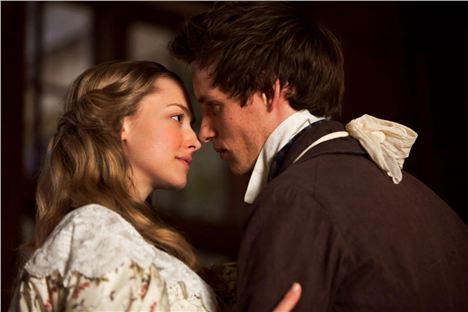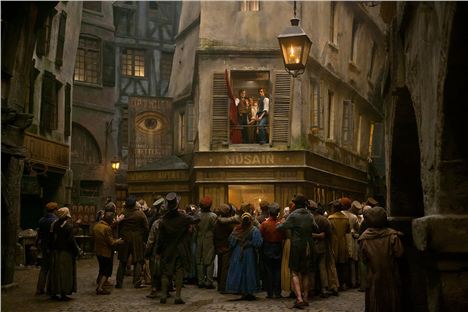TOM Hooper, successful director of The King’s Speech, has brought the English-speaking world’s longest running musical to the cinema, garnering BAFTA and Oscar nominations alongside a mountain of excitement from its multitude of fans.
All around me were the sounds of sobbing. The story, the music are certainly capable of moving people.
Based on Victor Hugo’s novel Les Miserables set in post-revolutionary, post-Waterloo-defeat France, the central story is a battle of wills and power between former convict Jean Valjean [Hugh Jackman] and police officer Javert [Russell Crowe].
Valjean has been imprisoned for nineteen years: five for stealing a loaf of bread and fourteen for attempting escape. Released on parole by a reluctant Javert who does not believe reform is possible, but prevented from earning an honest living by the stigma of imprisonment a desperate Valjean absconds parole but commits himself to a life of doing good after a priest saves him. Valjean becomes a factory owner and mayor, though always aware of the danger of being recognised by Javert.
Their paths cross and the pursuit begins. Valjean commits himself to finding and caring for Cosette, daughter of his former employee Fantine [Anne Hathaway]. Valjean rescues Cosette from the cruel care of the Thénardiers [Helena Bonham Carter, Sacha Baron Cohen] just escaping the pursuing Javert.
They meet again during the Paris uprising of 1832. Cosette falls for Marius [Eddie Redmayne] one of a group of student revolutionaries led by Enjolras [Aaron Tveit]. Her feelings are reciprocated but Marius has another admirer, Éponine Thénardier [Samantha Barks].
The film cannot fail commercially.
The musical has a worldwide fan base and claims 60 million have seen it on stage. If you’re going this weekend expect excited queues and a surround-sound of sobbing. The sets are impressive, the story clearly told and the singing, recorded live on set rather than performed to a pre-recorded sound, has a vibrancy and clarity that moves you along.
Performances are strong.
Hugh Jackman is consistent and believable. Russell Crowe may not be the best of singers but he carries the tune well enough and the lack of utter conviction in what he sings serves to make the character more believable; Javert has strong beliefs which he will never change, but Crowe managed to hint at occasional doubt.
Anne Hathaway sings ‘I Dreamed a Dream’ and performs to Oscar nomination standard. Eddie Redmayne is superb as Marius, his singing voice strong but with echoes of youth and beauty. Aaron Tveit is an appealing revolutionary, idealistic and charismatic.
Helena Bonham Carter and Sacha Baron Cohen take the Thénardier’s ‘Master of the House’ number beyond the standard comic song often presented on stage to show the appalling nature of their characters in superbly-directed scene of quick-fire pick-pocketing and debauchery, though Cohen’s mock-French accent grated. Samantha Barks, with stage experience as Éponine, sings ‘On My Own’ with great charm and sadness, until the last verse, where she adopts the X-Factor shouty approach.
All around me were the sounds of sobbing. The story, the music are certainly capable of moving people. It doesn’t work for me.
Like the musical, the film starts on a note of high emotion and we have nowhere else to go. The songs are loud and far too repetitive; the distraction of ‘Master of the House’ sorely needed.
The characters are pre-set; Valjean may change his behaviour during the early events, but his character is unchanging, essentially a good man who will only behave differently when his survival depends on it. Only Javert in this production displays any suggestion that he might alter his beliefs in the light of evidence, and that is through the quality of Russell Crow’s acting rather than the writing.
It’s hard to believe that in the maelstrom of early nineteenth-century France that a bread-stealing convict would be so condemned by society and a parole breaker would be so doggedly pursued. Were there no other criminals? Was no employer willing to take advantage and offer work at a much reduced wage? Does Javert not have bigger fish to fry?
And why do we leave the film, and the musical before it, with so little understanding of the times in which the events took place. We can argue that politics doesn’t translate well to musicals, but there are a few exceptions: ‘Evita’ in part, and even ‘Annie’ makes a reference to depression policies. Hugo’s novel was more than a story of individuals.
The musical, and the characters within it, have become brands, rather suitably for a 1980s musical. The acceptance of this is so strong that we’re meant to believe Tom Hooper’s claim that he would not have made the film if he couldn’t engage the cast he wanted, and that he had a shortlist of one to play Valjean. Hugh Jackman’s very good, but the idea that we are asked to believe that he is the only person in the world who could play that role is preposterous.
The sound and sets are impressive, performances pretty strong, camera-work interesting, though unsettling for some, and the vast army of fans will probably love 95% of it and hotly debate the remaining 5%.
But the hype surrounding the film can give rise to a feeling that ‘Can you hear the people sing?’ is about as hollow as one of those old mass-voiced banking adverts telling us it’s all about the customer.















